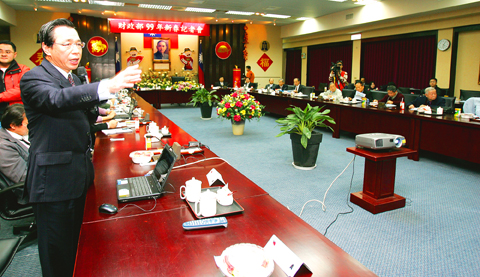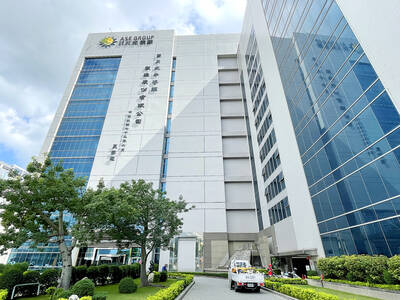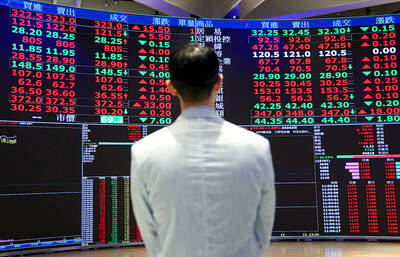The National Stabilization Fund’s (NSF) steering committee will meet tomorrow to discuss when to dispose of its local share holdings and whether a market-exit mechanism should be established.
Minister of Finance Lee Sush-der (李述德) told a press conference yesterday that the fund aims to stabilize the stock market.
“The public should not listen to hearsay,” he said about rumors on the fund’s share disposal, adding that unconfirmed information would only cause panic.

PHOTO: MAURICE TSAI, BLOOMBERG
The fund, which was established by the government a decade ago to bolster the nation’s equities markets, bought domestic shares in late 2008, when the global financial crisis hit the nation.
Based on current market prices, Lee said the fund had an unrealized profit of between NT$20 billion (US$628 million) and NT$30 billion on NT$59.9 billion in shares it had bought in the local bourse.
Whether the NSF would be able to sell shares without the authorization of its board would be up to the steering committee’s resolutions, Lee said, noting that saying anything wrong, especially about the stock market, could easily cause a public upset.
Meanwhile, in response to questions of whether the ministry will impose a so-called “hot money” tax to curb foreign capital inflows, Lee said that the ministry respected the central bank’s monetary measures.
“The ‘hot money’ tax is not yet a policy, and the ministry still doesn’t know much about it. But as long as the purpose is correct and has a legal base, the ministry would look forward to it,” Lee said.
The central bank issued a statement on Tuesday that highlighted comments about capital controls from international agencies and famous economists in the face of continued foreign capital inflows.
Deputy Minister of Finance Chang Sheng-ford (張盛和) told the Taipei Times by telephone yesterday that imposing financial transaction taxes would be too slow a step to use to stem foreign capital inflows because a law regulating such a tax would have to be enacted first.
Chang would not comment when asked if the ministry would follow Brazil in levying taxes on foreign capital investment, but said that it was too early to talk about the tax implementation.
“Financial and administrative measures should be adopted instead,” he said.

EXPANSION: The investment came as ASE in July told investors it would accelerate capacity growth to mitigate supply issues, and would boost spending by 16 percent ASE Technology Holding Co (ASE, 日月光投控), the world’s biggest chip assembly and testing service provider, yesterday said it is investing NT$17.6 billion (US$578.6 million) to build a new advanced chip packaging facility in Kaohsiung to cope with fast-growing demand from artificial intelligence (AI), high-performance-computing (HPC) and automotive applications. The new fab, called K18B, is to commence operation in the first quarter of 2028, offering chip-on-wafer-on-substrate (CoWoS) chip packaging and final testing services, ASE said in a statement. The fab is to create 2,000 new jobs upon its completion, ASE said. A wide spectrum of system-level chip packaging technologies would be available at

Taiwan’s foreign exchange reserves hit a record high at the end of last month, surpassing the US$600 billion mark for the first time, the central bank said yesterday. Last month, the country’s foreign exchange reserves rose US$5.51 billion from a month earlier to reach US$602.94 billion due to an increase in returns from the central bank’s portfolio management, the movement of other foreign currencies in the portfolio against the US dollar and the bank’s efforts to smooth the volatility of the New Taiwan dollar. Department of Foreign Exchange Director-General Eugene Tsai (蔡炯民)said a rate cut cycle launched by the US Federal Reserve

HEAVYWEIGHT: The TAIEX ended up 382.67 points, with about 280 of those points contributed by TSMC shares alone, which rose 2.56 percent to close at NT$1,400 Shares in Taiwan broke records at the end of yesterday’s session after contract chipmaker Taiwan Semiconductor Manufacturing Co (TSMC, 台積電) hit a fresh closing-high amid enthusiasm toward artificial intelligence (AI) development, dealers said. The TAIEX ended up 382.67 points, or 1.45 percent, at the day’s high of 26,761.06. Turnover totaled NT$463.09 billion (US$15.22 billion). “The local main board has repeatedly hit new closing highs in the past few sessions as investors continued to embrace high hopes about AI applications, taking cues from a strong showing in shares of US-based AI chip designer Nvidia Corp,” Hua Nan Securities Co (華南永昌證券) analyst Kevin Su

Nvidia Corp’s major server production partner Hon Hai Precision Industry Co (鴻海精密) reported 10.99 percent year-on-year growth in quarterly sales, signaling healthy demand for artificial intelligence (AI) infrastructure. Revenue totaled NT$2.06 trillion (US$67.72 billion) in the last quarter, in line with analysts’ projections, a company statement said. On a quarterly basis, revenue was up 14.47 percent. Hon Hai’s businesses cover four primary product segments: cloud and networking, smart consumer electronics, computing, and components and other products. Last quarter, “cloud and networking products delivered strong growth, components and other products demonstrated significant growth, while smart consumer electronics and computing products slightly declined,” compared with the